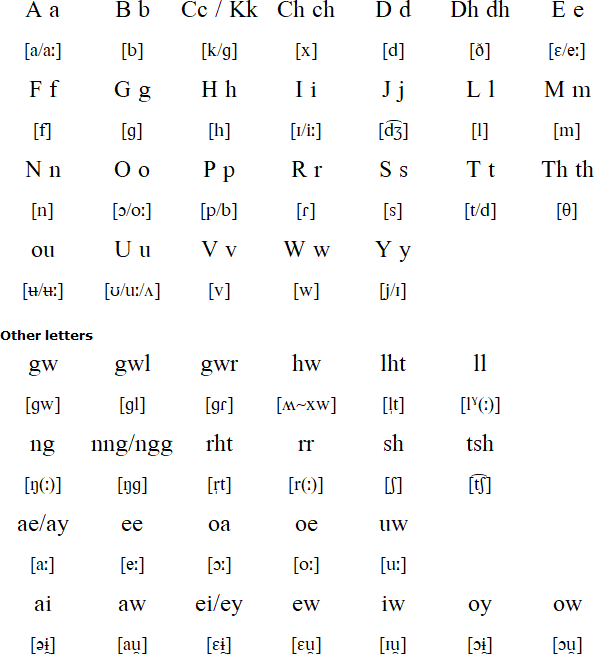Cumbric is a member of the Brythonic or Brittonic branch of the Celtic language family. It was spoken in the kingdoms of Rheged, Elmet, Gododdin and Strathclyde (Ystrad Clud / Alclud) - which are now southwest Scotland, and Cumbria, North Yorkshire and Lancashire in northern England. This area is refered to as Yr Hen Ogledd (The Old North) in Welsh. After Strathclyde came under control of Scotland in the 11th century, it is thought that Cumbric gradually became extinct, and it probably ceased to be spoken by the 12th or 13th century.
There are no known texts in Cumbric. Evidence for Cumbric comes mainly from place names, and from personal names recorded in Scottish, Irish and Anglo-Saxon texts. A few words of Cumbric origin were also used as legal terms in the Middle Ages in southwest Scotland. Some Cumbric words survive in dialects of English spoken in Cumbria, and the so-called 'sheep scoring numbers' are possibly remnants of Cumbric, and maybe from other extinct Celtic languages.
Placenames that are thought to be Cumbric include Carlisle (fort of Luguvallium), Glasgow (green hollow), Lanark (glade, clearing), Penrith (chief ford) and Penicuik (hill of the cuckoo).
Cumbraek is a reconstructed version of Cumbric created by Neil Whalley, who started working on it in 2007. He used the evidence mentioned above, and compared it with Middle Welsh, as well as modern Welsh, Cornish and Breton, to construct a language he initially called Cymbraġec. He later renamed it Cumbraek and aimed to make a modern language based on old Cumbric. He sees it as a constructed language, rather than an accurate representation of the historical language. He published a dictionary and grammar online in 2015.

Download an alphabet chart for Cumbric (Excel)
Is ganot pop din en ridh a gant barch a chuvreythyow custadhul. Ema resun a dirbooll dudho a gli poap emdhoon du'y gilidh in spirit brodoreth.
All human beings are born free and equal in dignity and rights. They are endowed with reason and conscience and should act towards one another in a spirit of brotherhood.
(Article 1 of the Universal Declaration of Human Rights)
Information about Cumbric | Phrases | Numbers | Tower of Babel
Information about the Cumbric language
https://en.wikipedia.org/wiki/Cumbric
https://cumbraek.wordpress.com/
https://www.cumbric.org/
https://twitter.com/CumbricWordOTD
http://linguifex.com/wiki/Cumbraek
https://www.facebook.com/Cumbraek
https://languagesgulper.com/eng/Cumbric.html
https://www.scribd.com/document/390053413/An-introduction-to-the-Cumbric-sounds-and-grammar
Information about Cumbrian dialect
https://en.wikipedia.org/wiki/Cumbrian_dialect
http://www.bbc.co.uk/radio4/routesofenglish/storysofar/programme1_1.shtml
http://www.cumbriandictionary.co.uk/
Information about Yr Hen Gogledd (The Old North)
https://en.wikipedia.org/wiki/Hen_Ogledd
https://en.wikipedia.org/wiki/Rheged
https://en.wikipedia.org/wiki/Elmet
https://en.wikipedia.org/wiki/Gododdin
https://en.wikipedia.org/wiki/Kingdom_of_Strathclyde
Breton, Celtiberian, Cornish, Cumbric, Gaulish, Irish, Lepontic, Lusitanian, Manx, Scottish Gaelic, Welsh
Languages written with the Latin alphabet
Page last modified: 20.08.23
[top]
You can support this site by Buying Me A Coffee, and if you like what you see on this page, you can use the buttons below to share it with people you know.

If you like this site and find it useful, you can support it by making a donation via PayPal or Patreon, or by contributing in other ways. Omniglot is how I make my living.
Note: all links on this site to Amazon.com, Amazon.co.uk
and Amazon.fr
are affiliate links. This means I earn a commission if you click on any of them and buy something. So by clicking on these links you can help to support this site.
[top]